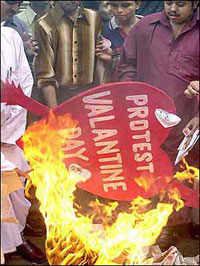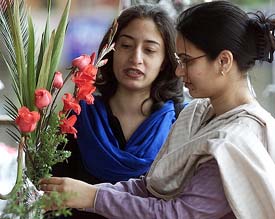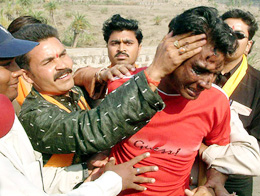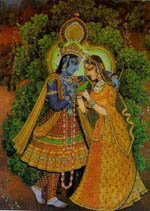
VALENTINE DAY - A HINDU FESTIVAL!
Author - Anil Chawla

|
VALENTINE DAY - A HINDU FESTIVAL!
|

Every year on 14 February, all over India, some groups take upon themselves the onerous task of defending the Hindu faith. The self-proclaimed defenders protest against celebration of Valentine Day, which they consider as an attack of the 'perverted decadent Western culture' on Indian 'dharm' and 'samskriti' (Sanskrit words for religion and culture but don't tell this to a die-hard fanatic saffronite in whose eyes dharm and samskriti acquire a mystical aura that is beyond the reach of religion and culture).
Origin of Valentine Day is not known. No one really knows whether it originated in Western world or it is actually an import into Europe from the Orient. Valentine Day is the festival of love, more particularly of erotic love. It is celebration of spring. One theory is that this is the time when birds in Europe (and much of northern hemisphere) start to mate. Surely, Valentine Day has no Christian origins. St. Valentine was not a Christian saint. Hearsay has it that he lived in Rome and revolted against a Roman emperor. Saint Valentine was no Christian. From all accounts, he was a pagan.
Dancing to the joys of spring or observing the mating of birds or celebration of erotic love - each of these is a distinctly pagan activity. Not surprisingly, Catholic Church has never approved of Valentine Day. Attitude of Church to Valentine Day ranges from tolerance to active opposition, depending on the strength of Church in the region.
Christianity, as well as Islam, dislikes the tendency of ordinary human beings to observe, understand or communicate with nature. No Christian or Muslim festival is dependent or even related to change of seasons. Truth was revealed to the prophet who was kind enough to pass it on to laypersons through the medium of clergy (and Gospel or Holy Quran). Anyone suggesting that there may be truth, which can be observed or experienced by every human being, commits an act of blasphemy fit to be punished by pain of death. Clergy, whether of Islam or Christianity, is always on its toes to prevent such blasphemous acts.
Pagan religions, in contrast, stress on building every individual's direct communication with nature. The role of priest or guru is that of a guide who holds one's hands through the journey and shows the way. There is no revelation that is exclusive to one and not available to the other. The path is open to every one who is willing to walk. There are some who can help you walk but no one has the right to issue a license to walk on the path, and no one can deny to you the right to walk on the path.
As a pagan one learns to observe, experience and even internalize every single element of nature. Plants, flowers, birds, bees, insects, animals, seasons, sun, moon, stars, fire, water, rivers - learning from them is a pagan activity. Looking at nature, one cannot help observing that change and transformation occur with regularity and periodicity. A pagan celebrates each change, whether it is of season or of life. Even old age and death are celebrated since they are seen to be essential stages in the constant process of transformation that nature goes through.
Islam and Christianity prohibit any celebration, which is not directly or indirectly linked to the respective prophet or at least to one of the official descendants (saints). Celebrating life or youth is not permitted and is considered sinful. Pagan religions, on the other hand, lay stress on celebrating life in its totality.
Sex is an essential (and enjoyable) part of life and pagans accept it to be so. Islam and Christianity do not accept sex in such a natural form. Christianity looks at sex as original sin. For a Christian, sex is permitted only under a license (called marriage) granted for the limited purpose of procreation. For a Muslim, sex is a reward granted by Allah to the devout for their good deeds. On earth, this reward is available in limited dosage. But one can do good deeds and earn a place in heaven where the Almighty rewards the faithful men with houris, stunningly beautiful women capable of acting as ultimate sex machines. (I do not know whether similar facility exists for faithful women)
Christianity and Islam regulate sex lives of their faithful for their own respective reasons. Pagan religions have a more liberal attitude to sex. The emphasis in paganism is on responsible sex rather than regulation or licensing. One is free as long as one accepts full responsibility for one's actions and acts in a manner that helps the continuous operation and maintenance of society.
Hinduism is the oldest and the largest surviving pagan religion in the world. To understand the attitude of Hinduism to sex, let us look at an instance from Hindu mythology. It relates to King Dushyanta going to forest and seeing Shakuntala, daughter of a sage. Dushyanta and Shakuntala saw each other, liked what they saw and well, as they say, one thing led to the other. A few months later Shakuntala gave birth to a son, who was named as Bharat. The marriage of Duhsyanta and Shakuntala was not solemnized by any priest. Yet, Bharat was not ostracized as a bastard. He rose to be a famous king. Some people believe that India's original name, Bhaarat, is derived from King Bharat's name.
In a country, whose name is said to be based on someone born out of free erotic coupling between two consenting adults, it is unimaginable that erotic love be considered as a taboo. In fact, from all historical accounts as well as based on the study of ancient Indian literature one can say that Indian culture was always fairly liberal in this respect.

As one would expect from a pagan civilization, celebration of natural changes in seasons and in life is an essential feature of Indian life. There is a festival to mark every change of seasons. Tradition of celebrating onset of spring has been a part of Indian culture since times immemorial. Sanskrit literature has references of Vasantotsav or Madanotsav or Kamotsav (different names for Spring Festival).
In this context it is interesting to note that even today in Lahore, Pakistan spring festival (called Vasant) is celebrated with gaiety and fervor. Mullahs do not like it. They oppose it tooth and nail since they see it as a Hindu festival.

Valentine Day is also a spring festival, with no roots in Christian or Muslim or Judaic tradition. It is based on two key pagan beliefs - (a) celebration of natural change and (b) erotic love is a creative force of the universe that should be respected and celebrated. It may, hence, be said that Valentine Day is a pagan festival.
Going a step further, one may even see it as a different form of ancient Hindu festival of Vasant or spring. Valentine Day is not a Hindu festival in the traditional sense of the term, but it certainly is more Hindu than Christian or Muslim or Jewish.
Unfortunately, Hindus today do not see themselves as torchbearers of the glorious pagan traditions, which were destroyed in a most cruel manner in the last fifteen hundred years. Paganism and pagan festivals are getting back into vogue in most parts of the world. Hindus can provide leadership to this global uprising of paganism.
Sadly, Hindus are represented by organizations, whose leaders cannot think beyond their noses. Any talk of Hindus leading the global pagan movement in front of such leaders is, as a Hindi proverb puts it, playing flute before a buffalo.
It is these buffalo-headed ones who oppose Valentine Day every year. Vast majority of Hindu population ignores them. Valentine Day continues to gain popularity in India because it agrees with the spirit of the country's ancient civilization. In each city, a few stray lathi-bearing (lathi is a bamboo stick used as a weapon) ruffians seem to be the only people who are listening to the leaders who make lofty claims of representing all Hindus and protecting Hindu 'dharam' and 'samskriti'.

Bajrang Dal activists blackening the face of a lover
in Bhopal, India
Let us just pray that Radha-Krishn, the divine couple, drive some sanity into the heads of these ruffians and their leaders who see Victorian Christian morality as the ideal to be pursued by Hindus. On our part, let us ignore these fools and follow the example of Lord Krishn and walk the path of love. Let us celebrate life! Let us celebrate nature! Let us celebrate the onset of spring! Let us celebrate Valentine Day! Happy Valentine Day!

Anil Chawla
15 February 2005
Please write to me your comments about the above article.
 anil@samarthbharat.com
anil@samarthbharat.com
 hindustanstudies@yahoo.co.in
hindustanstudies@yahoo.co.in

ANIL CHAWLA is an engineer (and now a lawyer too) by qualification but a philosopher by vocation and a management consultant by profession.

Website developed and managed by

MF-104, Ajay Towers, E5/1 (Commercial),
Arera Colony,
Bhopal - 462016 INDIA


© All Rights Free